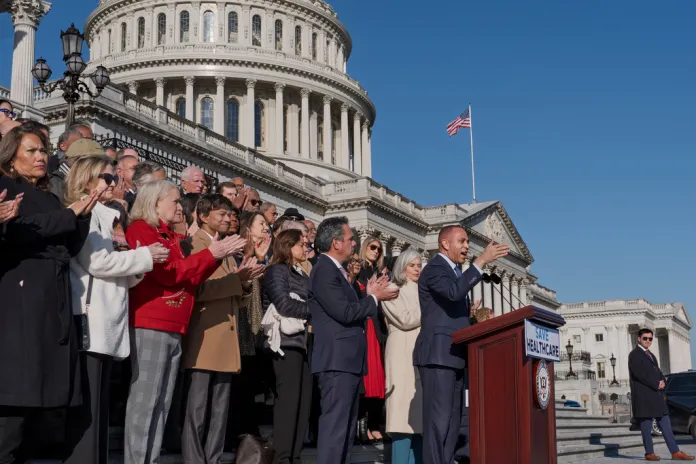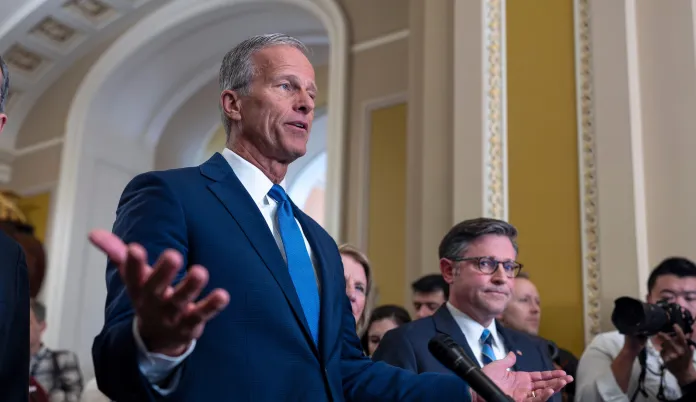Dismal failures in healthcare system make the US an unsuccessful nation, report says – Washington Examiner
A recent report by the Commonwealth Fund, titled ”Mirror, Mirror 2024: A Portrait of the Failing U.S. Health System,” concludes that the United States is failing to adequately ensure the health and welfare of its citizens, which undermines claims of being a successful nation. Despite spending the most on healthcare, the U.S. ranks lowest among ten wealthy countries in areas such as access to care, administrative efficiency, equity, and health outcomes. Factors contributing to this dismal state include misaligned incentives that encourage late care seeking and a lack of effective primary care infrastructure, leading to higher costs and poor preventive services.
Experts emphasize that primary care physicians are undervalued, which deters new medical graduates, and the healthcare system’s focus on revenue rather than patient outcomes exacerbates the issues. Additionally, problems are widespread across the healthcare ecosystem, affecting pharmacists and dentists, and emphasizing a need for value-based care. Social determinants of health play a significant role in health disparities, suggesting that investment in socioeconomic factors is essential to achieve greater health equity. the report highlights the need for accessible, affordable care and a shift in focus towards better primary care to improve health outcomes for all Americans.
Dismal failures in healthcare system make the US an unsuccessful nation, report says
The United States is failing to meet one of its main obligations, namely, the health and welfare of its citizens. In doing so, it cannot describe itself as a successful nation.
This is the brutal conclusion of a recent Mirror, Mirror 2024: A Portrait of the Failing U.S. Health System report on healthcare across rich nations from the Commonwealth Fund. The report lists the U.S. as the lowest-ranked system overall despite the fact that it spends by far the most on healthcare.
In four of five categories, the U.S. is either the lowest or second-lowest ranked in the survey, which compared the health systems of ten wealthy countries. Those four categories are access to care, administrative efficiency, equity, and health outcomes.
“Most of the countries we compared are providing this protection, even though each can learn a good deal from its peers,” the report concluded. “The U.S., in failing this ultimate test of a successful nation, remains an outlier.”
Where’s the incentive?
Misaligned incentives are playing a role in such a dismal result, said Lucienne Ide, M.D., Ph.D., and chief executive officer at Rimidi, a remote patient monitoring company.
The U.S. healthcare system leaves 26 million people uninsured and even more underinsured, disincentivizing people from accessing care until the last, costly minute, she said. In addition, the lack of an effective primary care infrastructure plays a big role in exacerbating a comparative absence of preventive screening and higher-quality disease management.
“One of the great paradoxes of the U.S. healthcare system is that if you are seriously ill, there is nowhere else you would rather be,” she said. “Yet, if you want accessible, affordable preventative care, the U.S. is the last place where you want to be.”
Alexandra Tien, M.D., a family physician at Medical Associates of Rhode Island, agreed that the healthcare sector pays lip service to the importance of primary care.
“Primary care doctors are the worst-paid physicians, and until that changes, medical school graduates with hundreds of thousands of dollars in debt (because we don’t subsidize medical education in this country) will be sure to run from primary care as fast as they can,” she said. “As a country, we pay lip service to the importance of primary care without actually paying primary care physicians accordingly.”
Current incentives in healthcare are, in fact, not aimed at providing the best care possible for patients but are rather driven by revenue opportunities, said Warris Bokhari, M.D., co-founder and CEO of Claimable, an AI-powered health insurance appeals company. He said insurance companies and healthcare systems benefit from such incentives, not patients.
“Our system incentivizes short-term gains over long-term health outcomes, making business performance the primary metric for success,” he said. “In the end, the two industries — medicine and insurance — are bound by name only, leaving patients in a system that treats care as a line item, not a commitment.”
In addition, ever-larger healthcare systems are increasingly buying up previously independent practices, further driving up costs to patients, Bokhari added.
Not just hospitals
The dysfunction runs across the whole health ecosystem. Pharmacists and dentists experience similar complications and should also be taken into account when discussing the problems besetting the whole U.S. health system.
Consolidation in the pharmacy benefit management and digital health spaces, for example, highlights the problems of high costs, administrative inefficiencies, and the lack of access to primary care, according to Lindsay Dymowski, CEO of Philadelphia-based Centennial Pharmacy Services.
In dentistry, too, greater integration of oral health into the ecosystem would help build the bridge between it and overall health.
“Shifting toward value-based care, in which providers are rewarded for quality care and health outcomes, rather than the quantity of care delivered, will incentivize prevention and personalization in care,” said Melissa Burroughs, public policy director at Boston-based CareQuest Institute for Oral Health.
The one-on-one patient-physician relationship has largely been forgotten as health systems and insurers focus on business concepts such as “productivity” and “consumer-driven wants,” and nowhere is this more obvious than in the failures of primary care, argued Dr. Drew Remignanti, M.D., a retired emergency medicine physician and author of The Healing Connection: A Partnership for Your Health.
“It is only through a trusting and mutually respectful one-on-one patient-physician relationship that we can safely navigate the vagaries of modern healthcare,” he said. “We, therefore, need to incentivize primary care for both patients and physicians alike.”
Social determinants do indeed determine
Health disparities are rampant in such a dysfunctional system, with approximately 80% of health outcomes influenced by social determinants of health as compared with a 20% figure influenced by actual clinical care, said Didier Choukroun, CEO of SPHERE Investments, a Miami-based real estate company focused on improving healthcare environments.
Investments must be targeted at enhancing socioeconomic factors, physical environments, and health behaviors to encourage greater health equity. Such a focus can also be helped by a greater concentration on value-based care, Choukroun said.
The reality is that, without the necessary steps in place for adequate primary care from an early age for everyone, many individuals transition into the Medicare years with chronic conditions and low health literacy, increasing costs and lessening the effectiveness of value-based care initiatives, according to Jenn Kerfoot, chief strategy and growth officer at DUOS, a digital health innovator aimed at helping older adults live more independently.
“Ensuring every American has access to a foundation of health knowledge and preventative care can help us mitigate costs down the line, reduce chronic disease burdens, and ultimately allow Medicare to better fulfill its mission for future generations,” she said.
Care must be more accessible and affordable for patients while being more profitable and sustainable for providers, sources said. Emphasizing the health of individuals in a country where life expectancy is four years below the average of other nations must come first, above the health of the bottom line.
“The bottom line is that the cost of healthcare in the U.S. is the highest in the world, and we have little to show for it,” said Tien. “The main reason for this is our dependence on the middleman and the proliferation of bureaucrats, all designed to make our “system” needlessly complex and intertwined in a dysfunctional mess.”
The countries surveyed for the report, in addition to the U.S., were as follows: Australia, Canada, France, Germany, the Netherlands, New Zealand, Sweden, Switzerland, and the United Kingdom. Australia was the highest-ranked overall system and one of the nations spending the least on healthcare.
“Reversing the dismal track record of the U.S. health system would require multiple, demanding interventions by government at all levels and by the private sector,” the report concludes.
Nick Thomas is a writer based in Denver.
" Conservative News Daily does not always share or support the views and opinions expressed here; they are just those of the writer."




